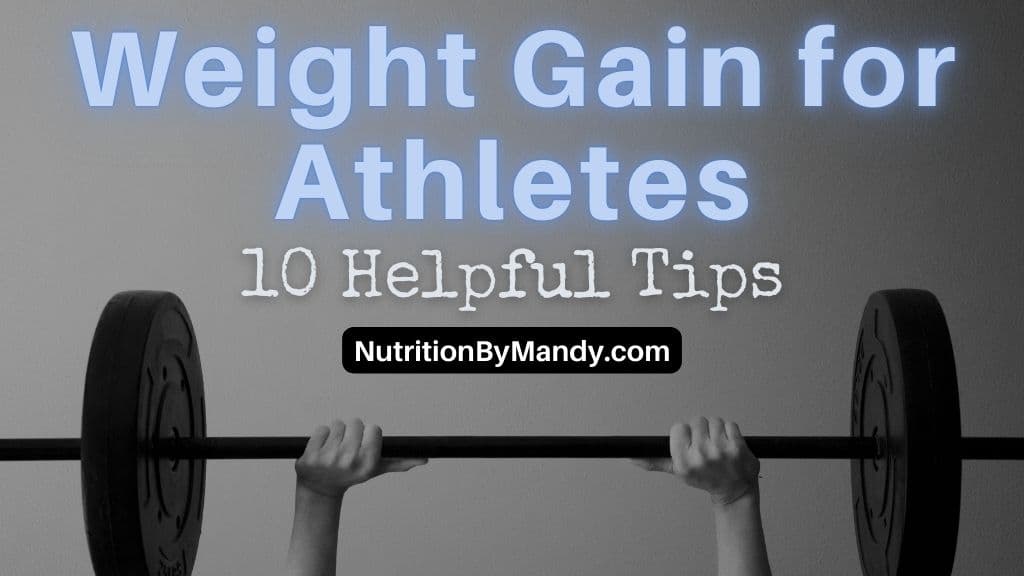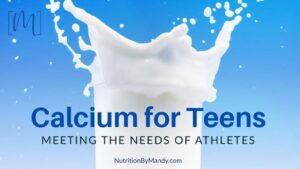Last Updated on December 19, 2024 by Mandy Tyler, M.Ed., RD, CSSD, LD
Weight Gain for Athletes: 10 Helpful Tips
I frequently work with athletes who are looking for nutrition ideas to help them gain weight.
With so much nutrition information available, it can be a challenge for athletes to know what to eat to support their weight gain goals.
Here are 10 easy to implement nutrition tips to share with athletes to assist them with gaining weight.
Weight Gain for Athletes: 10 Helpful Tips
Tip #1: Eat Frequently to Promote Weight Gain for Athletes
When I visit with an athlete who desires to gain weight, the first thing I do is review the athlete’s current daily eating routine. A key concept for supporting weight gain is ensuring the athlete is eating frequent meals and snacks throughout the day.
I like to encourage athletes to set a goal of eating three meals and three snacks each day. To make this happen, athletes need to take time to plan ahead for the upcoming week.
Athletes should consider when they have early morning practices, two-a-day workouts, evening competitions, or any other activities scheduled that they need to plan meals/snacks around.
Plan Ahead to Support an Athlete’s Weight Gain Goals
Doing some basic meal prep or ingredient prep tasks on the weekend can help ensure athletes have well-balanced meals and healthy snacks available throughout the week.
Example meal and ingredient prep tasks may include:
- Make protein overnight oats
- Hard-boil eggs
- Slice fresh fruits and vegetables
- Individually package trail mix, nuts, pretzels, jerky, or other snack items
- Pre-make deli meat and cheese sandwiches

Tip #2: Spread Protein Intake Throughout the Day
It is important for athletes who desire to gain weight to make sure they are meeting their daily protein needs.
It is recognized that athletes need more protein than the current Recommended Daily Allowance (RDA) of 0.8 g/kg/day. A daily intake of 1.4-2.0 g/kg/day is suggested for athletes looking to build and maintain lean muscle mass (1).
In general, I find most athletes consume an adequate amount of protein. However, an area many athletes can improve on is the distribution of their protein intake throughout the day.
To optimally support the building and maintenance of muscle mass, athletes should aim to eat ~0.25-0.3 grams of protein per kg of body weight with meals and snacks spaced throughout the day (1, 2).
This calculates to be in the range of 20-40 grams of protein per meal, with larger athletes needing more protein than smaller athletes.
Ideas for Adding Protein to Breakfast for Athletes
Many athletes do well with eating protein at lunch and dinner. However, an area most athletes can quickly improve on is adding protein to breakfast.
Ideas I commonly share to help athletes boost their protein intake at breakfast include:
- Individual containers of Greek yogurt or cottage cheese
- Eggs, hard-boiled eggs
- High-protein milk
- Nuts, nut butters
- String cheese, cheese sticks, sliced cheese
- Turkey or chicken sausage
- Ham, turkey, grilled chicken
- Protein pancakes or waffles (i.e., Kodiak Cakes®)
- Protein overnight oats
Protein Intake and Muscle Building
It is important for athletes who are trying to build muscle to remember that protein intake alone is not going to cause muscle growth.
For athletes to build muscle, protein intake must be combined with a well-planned strength and conditioning program.
Combining an individualized sports nutrition plan with a strength training program will help set athletes up for success in accomplishing their weight gain goals.

Tip #3: Add in Healthy Fats to Support Weight Gain in Athletes
In addition to protein, athletes who desire to gain weight should focus on incorporating healthy, unsaturated fats into their meals and snacks.
Fat contains more than double the amount of calories per gram than carbohydrates and protein contain (9 calories per gram vs. 4 calories per gram).
Therefore, adding healthy fats to the diet is an easy way for an athlete to increase their total daily caloric intake.
Healthy Fats to Support Weight Gain for Athletes
There are a variety of ways athletes can add healthy, unsaturated fats to their sports nutrition meal plan, including:
- Nuts and nut butter
- Seeds and seed butter
- Avocados and guacamole
- Olives and olive oil
- Liquid vegetable oils: Canola, sunflower, safflower, corn, soybean
- Salad dressings and spreads made with liquid vegetable oils
Tip #4: Consume Nutritious Drinks with Meals and Snacks
Another easy way to add healthy calories, vitamins, and minerals to an athlete’s diet is by encouraging athletes to drink nutritious beverages with their meals and snacks.
Healthy drink ideas include:
- Whole milk
- Whole chocolate milk
- 100% fruit juice
- 100% fruit/vegetable juice blend
To avoid filling up on the beverage, athletes should eat their meal first and then drink the beverage.
Tip #5: Power-Up with High-Calorie Smoothies
In addition to drinking beverages with their meals, high-calorie smoothies can be a great way for athletes to add nutritious calories to their day.
Athletes can make a nutrient-packed smoothie by blending together their favorite frozen fruits, banana slices, leafy greens, as well as Greek yogurt, and high-protein milk.
Then to further boost the nutrient and calorie content of the smoothie athletes can blend in some of the following ingredients.
- 100% fruit juice
- Nut or seed butter
- Chia seeds or ground flaxseeds
- Avocado
- Cottage cheese
- Silken tofu
- Dates
- Cocoa powder
- Rolled oats
Tip #6: Select Calorie Dense Foods to Help Athletes with Weight Gain
Adding calorie dense foods to meals and snacks can also help athletes with gaining weight. Calorie dense foods contain a high number of calories relative to their weight.
I like to tell athletes that the advantage of a calorie dense food is that the food provides a large number of calories, but requires little chewing.
Thus, calorie dense foods are an easy way for athletes to increase their total daily caloric intake without having to greatly increase the amount of food they are consuming.
Examples of calorie dense foods that athletes can enjoy to support their weight gain goals include:
- Dried fruit
- Granola
- Avocado, guacamole
- Nuts and nut butters
- Seeds and seed butters
- Whole grain bread and bagels
- Quinoa, rice, pasta
- Starchy vegetables: Potatoes, sweet potatoes, winter squash
- Olive oil, vegetable oils, salad dressings made with vegetable oils
In addition to providing calories, many of these foods are also rich in vitamins, minerals, and antioxidants. Therefore, they make nutritious additions to an athlete’s sports nutrition meal plan.

Tip #7: Top Your Food
Another easy to implement tip to support weight gain for athletes is to have them top their oatmeal, cereal, sandwiches, salads, wraps, and sides with calorie-rich food items.
Examples include:
- Oatmeal: Dried fruit, berries, sliced banana, nuts, nut butter, seeds, whole milk, maple syrup, honey
- Sandwiches/wraps: Guacamole, avocado, hummus, nut butter, mayonnaise, olive oil
- Salads: Dried fruit, nuts, seeds, beans, hard-boiled eggs, olives, olive oil, salad dressing
- Sides: Drizzle olive oil on top of veggies, pasta, bread; use whole milk in recipes
Tip #8: Up Your Portion Sizes
In addition to adding calorie-dense toppings to food, I encourage athletes to aim to increase their portion sizes at meals and snacks. In particular, they should focus on increasing the portion sizes of those items that are higher in calories.
For example, with their meals, athletes can increase the portion size of side items such as pasta, rice, and potatoes.
At snacks, athletes can add extra nut butter to sandwiches, toss more seeds and nuts into trail mix, and add a double-serving of granola to a yogurt parfait.
Tip #9: Fuel Your Workouts
Athletes who desire to gain weight should pay particular attention to what they eat before and after their workouts.
Pre-Workout Carbohydrates
It is important for athletes to make sure they go into workouts and competitions well fueled. Prior to working out, athletes should consume foods that provide a good source of carbohydrates.
Similar to gas in a car, carbohydrates provide athletes with the energy they need to train and perform at their best.
Example high-carbohydrate snacks include:
- Fresh fruit, dry fruit, applesauce
- Dry cereal, bagels, toast with jelly
- Pretzels, pita chips, graham crackers, animal crackers
- Granola bars, breakfast bars, fig bars

Focus on Recovery Nutrition
Following a workout or competition, athletes should take time to refuel their bodies. After activity, there are three key areas athletes should focus on to support their recovery nutrition needs.
- Rehydrate: Replace fluid and electrolytes lost in sweat
- Refuel: Consume carbohydrates to replace energy stores used during activity
- Build and Repair: Consume protein to help build and repair lean muscle mass
I find that recovery nutrition is one area that many athletes who desire to gain weight can quickly capitalize on.
Too often athletes do not eat following a workout and miss out on an essential opportunity to fuel their bodies.
Recovery Nutrition Snack Ideas
Athletes should keep snacks available in their backpacks and gym bags that they can enjoy following a workout or competition.
- Chocolate milk and granola bars
- Peanut butter and jelly sandwich with milk
- Greek yogurt, berries, and granola
- Trail mix with pretzels, dried fruit, nuts, and dry cereal with sports drink
- Sliced cheese, ham, and whole grain crackers with 100% fruit juice
- Turkey and cheese wrap with sports drink
- Bagel with nut butter, honey, and banana slices with milk
- Sports bar with sports drink
- Post-workout smoothie
Athletes can then follow-up their recovery nutrition snack with a well-balanced post-game meal in the next couple of hours.

Tip #10: End the Day with a High-Protein Bedtime Snack
Finally, athletes who desire to gain weight should focus on having a high-protein evening snack before bed. I encourage athletes to try and consume this snack in the hour before going to sleep.
During sleep the body recovers from the activities of the day. Consuming protein before going to bed can help promote muscle protein synthesis during the overnight recovery period (1, 3).
A protein-rich fruit smoothie is a nutritious evening snack option and an easy way for athletes to meet their protein needs.
Additional ideas for adding protein to an evening snack include:
- High-protein milk
- Cottage cheese
- Nut butter
- Protein pancakes or waffles (delicious topped with nut butter)

Weight Gain for Athletes: 10 Helpful Tips
You are now set with 10 tips to help athletes with gaining weight. Combining the tips shared above with a well-planned strength and conditioning program will help support athletes with achieving their weight gain goals.
For additional sports nutrition tips, check out my blog on pre-workout vs. post-workout nutrition.
Join the Nutrition By Mandy Email List & Get a Free Athlete’s Grocery List
Click HERE to join the Nutrition By Mandy e-mail list. When you join you will receive a free athlete’s grocery list to print and take with you to the store.
About the Author
Mandy Tyler is a Sports Dietitian Nutritionist in the San Antonio, TX area. She is a Registered and Licensed Dietitian, a Board-Certified Specialist in Sports Dietetics, a Licensed Athletic Trainer, and is a Certified Exercise Physiologist through the American College of Sports Medicine. Mandy has experience working with athletes at the high school, collegiate, and professional levels. She believes the key to reaching one’s full potential, both in everyday life and in sports performance, relies on a healthy nutritional foundation.

If you are looking to take your performance to the next level, make sure to check out my new Sports Nutrition Game Day Guide. This downloadable guide is written to help athletes develop an individualized plan to achieve peak performance on game day.





